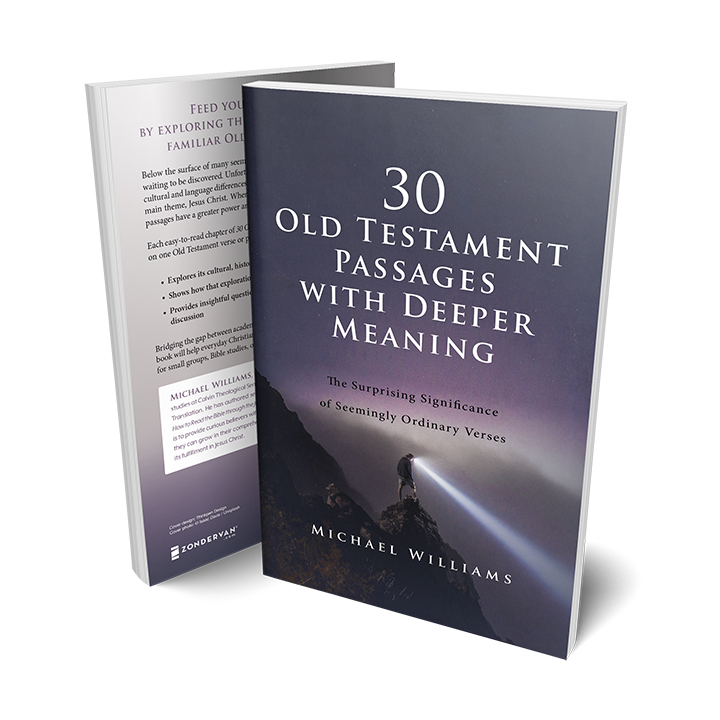Written by Michael Williams

My love for the Old Testament began in an unusual place. I was hundreds of feet below the North Atlantic on patrol in a U.S. Navy nuclear submarine when I first understood the gospel, placed my faith in Jesus Christ, and began reading the Bible. Most of the Bible is the Old Testament, and Jesus himself said that the Old Testament Scriptures were all about him (Luke 24:44; John 5:39). Studying the Old Testament seemed like a great way to start learning about the Bible and Jesus.
I soon realized that understanding the Old Testament might not be as easy as I had hoped. Suspecting there was more to the stories than I was grasping, I pursued academic study. I learned the original languages and began to see how the biblical authors used language in creative ways to add depth and power to their messages.
After my education, I taught Old Testament and ancient Near Eastern languages and literature for 24 years at Calvin Theological Seminary. One of my favorite courses invited students to search the creative ways biblical authors crafted their accounts to draw in readers and pack literary punch. Every year, we discovered a tactic that we had previously missed. This raised my understanding and appreciation for biblical literature to another level.
Most believers don’t have these opportunities to study biblical languages and cultural environment. And, when most biblical scholars write about these things, they often write for other biblical scholars. I wrote 30 Old Testament Passages with Deeper Meaning to make these studies available for the wider church. The book shows how the message of the Bible is deepened for us by an appreciation for its literary techniques, cultural allusions, and theological focus on Jesus.
A Seemingly Ordinary Verse
“For giving prudence to those who are simple…”
The book of Proverbs provides an array of benefits to those are willing to internalize its wisdom. We are told that the proverbs will enable us to gain wisdom and instruction, understand words of insight (1:2), and receive instruction in prudent behavior so that we can do what is right and just and fair (1:3). In 1:4, we are told these proverbs will also give prudence to those who are simple. “Simple” is not an adjective most people would like to have ascribed to them. Those with even a modicum of self-esteem might conclude that this book was not written for them. But this conclusion would be based on a faulty understanding of the biblical meaning of the word “simple.”
But Wait, There’s More!
The Hebrew word translated as “simple” here does not have anything to do with mental acuity or even urbane sophistication. It refers instead to those who are inexperienced or untrained in the potentially dangerous ways of the world. Such people are overly trusting, naive, easily led astray, and probably have not been taken advantage of by others.
None of us is born with immunity from this. However, those who are simple—that is, those who are aware of and admit their vulnerability—have one characteristic that differentiates them from those described in Proverbs as “fools”: the simple are teachable. To all of us who are teachable, then, who acknowledge that we too are susceptible to the trickery of malicious opportunists, our verse offers “prudence.” But this word in our passage has a surprisingly significant meaning that is probably much deeper than you think it is.
Knowledge for Good or for Evil
In the context of the opening verses of Proverbs, prudence is presented as the antidote to simpleness. If the simple are those who are easily led astray and taken advantage of, then prudence is something that can prevent that from happening. We might describe prudence as “street smarts.”
The book of Proverbs, therefore, is offering us the means to develop an awareness of how things really work in everyday life, and how to live circumspectly in light of that knowledge. This knowledge is, however, amoral in itself. Its morality depends on how it is used. Consequently, the insight Proverbs gives us into the inner workings of the world and human beings can be used either for good or for evil.
A Surprising Connection
Through our deeper consideration of prudence, or street smarts, we also discover a hidden connection between our verse and the first appearance of evil in the world.
To understand this connection, we must note some details of the Hebrew underlying our English translations. The word “prudence” is a translation of the Hebrew word עָרְמָה (‘ormâ) In Hebrew, words are formed around a base of three consonants. By adjusting the vowels, prefixes, and suffixes around these three consonants, different nuances of the word can be expressed. In the case of “prudence” in 1:4, the three Hebrew consonants that communicate the basic meaning of the word are ע-ר- ם (ʿ-r- m). The vowels surrounding these consonants let us know that this word עָרְמָה (‘ormâ) is a noun. By putting different vowels around these same three consonants, one can express the basic meaning of the word as an adjective.
Genesis 3:1
This is precisely what we find in Genesis 3:1, where the serpent in the garden of Eden is described as “more crafty [ עָרוּם ‘ārûm] than any of the wild animals the Lord God had made.” You probably noticed that the same three consonants are used in Genesis 3:1 and Proverbs 1:4: ע-ר- ם (ʿ-r- m). The only difference is that the vowels used to indicate the noun form of the word (Prov 1:4) are different from the vowels used to indicate the adjectival form of the word (Gen 3:1).
Genesis 3:1 is saying that the serpent had the same street smarts that the book of Proverbs offers its readers, but the serpent used that insight for evil instead of good. The book of Proverbs, on the other hand, wants its readers to use that knowledge for good. “Prudence” or “shrewdness,” therefore, is neither a positive nor a negative characteristic when considered by itself. It’s how that situational and interpersonal awareness is used that makes it positive or negative.
Be as Shrewd as Snakes
This reexamination of this verse helps us understand what Jesus meant when he gave instructions to his disciples before he sent them out with the gospel. He told them that, as they encountered those who would test them, they should “be as shrewd as snakes and as innocent as doves” (Matt 10:16).
The connection between Jesus’s encouragement to be “as shrewd as snakes” and the shrewdness of the serpent in Genesis 3:1 is supported by the Greek word Jesus used. In the Septuagint (the Greek translation of the Old Testament), the word used to describe the serpent is φρονιμος (phronimos). This is the same Greek word Jesus used in Matthew 10:16!
Jesus’s words remind us that being his disciple does not mean closing our eyes to the realities of life. It means being keenly aware of those realities and using that awareness to advance the gospel of peace. Christian prudence is an ability to recognize and artfully sidestep the many traps set before us so that we can progress safely along the path of true life and invite others to join us on that path.
What a wonderful depth of meaning in the words of this passage! Our fresh insight into the meaning of these words helps us live out our Christian lives in a world full of dangers, which we can avoid with a little prudence, available in the book of Proverbs.
30 Old Testament Passages with Deeper Meaning contains easy-to-read chapters that focus on a verse or passage, and:
- Examine its cultural, historical, linguistic, and/or theological context.
- Explain how it is enhanced by the added context and perspective.
- Provide questions to facilitate further reflection, study, and discussion.
Helping to bridge the gap between the academy and the church, this broadly accessible and edifying book will help Christians get more out of their Bible. This is an ideal small group, Bible study, or expository preaching resource.
Michael Williams (PhD, University of Pennsylvania) is Emeritus Senior Professor of Old Testament Studies at Calvin Theological Seminary, a member of the NIV Committee on Bible Translation, Chairman of the NIrV Committee, and author of many books, including How to Read the Bible through the Jesus Lens and Hidden Prophets of the Bible. His passion is to provide curious believers with knowledge of the Old Testament and its culture so that they may grow in their comprehension and appreciation of redemptive history and be adequately prepared to promote and defend the faith through word and action.
30 Old Testament Passages with Deeper Meaning is published by Zondervan, a division of HarperCollins Christian Publishing, Inc., the parent company of Bible Gateway.
The post Deeper Meanings in The Old Testament appeared first on Bible Gateway Blog.










